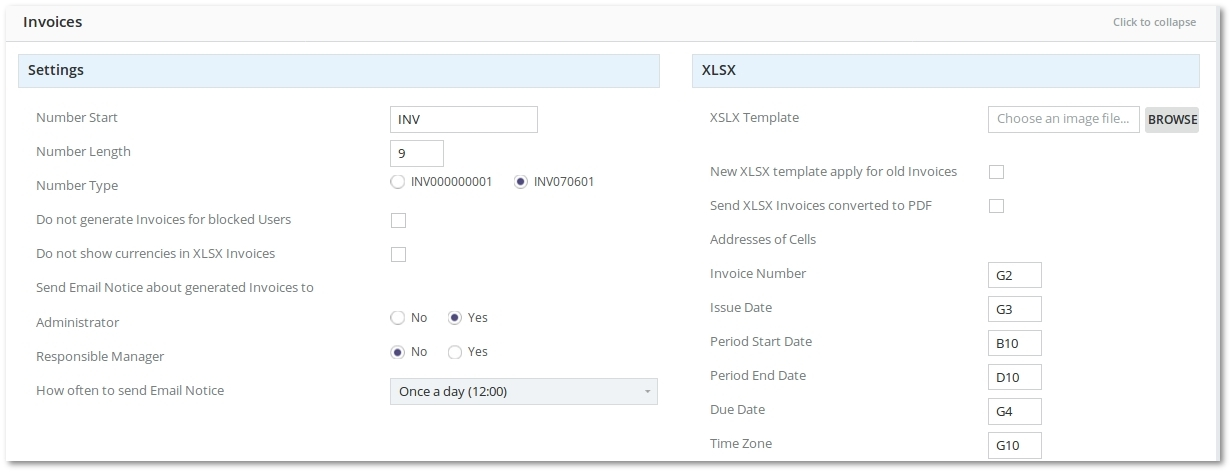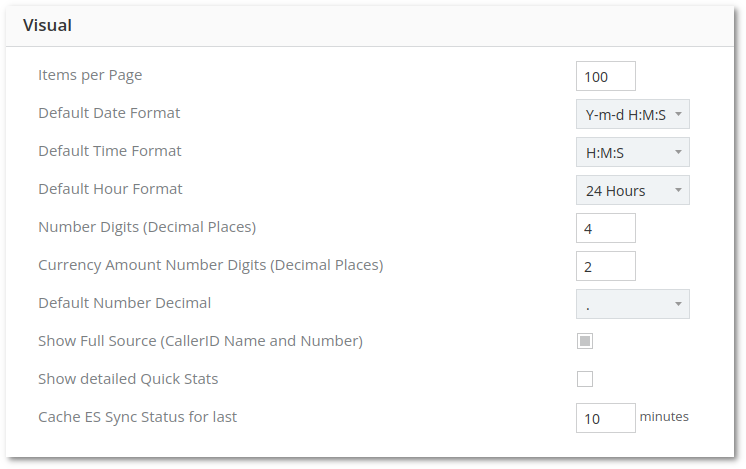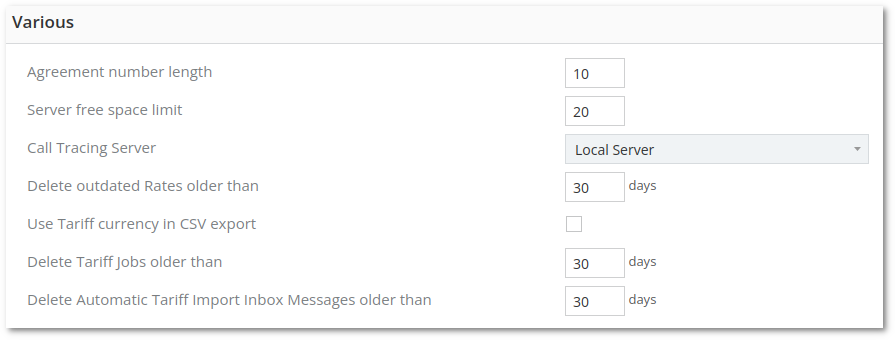M4 Settings
To change M2 Settings, go to MAINTENANCE - Settings
Just click on each point to expand.
Invoices
- Number start – how the invoice number should start.
- Number length – the length in digits AFTER Number Start – e.g. Number Start is not counted into this length. This value is active only for first number type.
- Number type – select more appropriate number format.
XLSX
XLSX file to export an Invoice is made from your own XLSX format template and information from Invoices main window.
Example of template can be downloaded here.
When you already have a template for example with all data of your company, with drawn tables and so on, you need to define where should be shown the dynamic information of invoice. To do that you just need to define cell address in correct format.
Emails
- Sending globally enabled – if this is checked, you will be able to use Mass Mailing and the system will send emails upon user registration.
- SMTP server – hostname of the server.
- Port – port of SMTP server.
- Login – username to your SMTP server.
- Password – password to your SMTP server.
- Batch size – value for Mass Mailing, or how many emails to send at once.
- From – email address to put into From: field in email. Acceptable formats are: example@email.com or John Smith <example@email.com>.
- Test email sending – save settings and press this to test email sending. Do not forget to save settings first!
P.S. Remember to set admin's e-mail in admin's personal settings. Without this test email sending will not work!
Tax
- Settings are explained here: Multi-Tax system
Security
- Use strong passwords for users - password must contain at least one numeric value, capital and lowercase symbol and must at be at least 8 characters long.
- Admin login with approved IP only - security measure which allows to approve IP's that try to login with Admin Account.
- Enable IP report warning on login failure - show warning on unsuccessful login attempts.
- Logout after password change - terminates all sessions of the User whose password is changed.
Active Calls
- How many maximum Active Calls to show in GUI – how many to show in GUI
- Active Calls refresh interval – Active Calls refresh interval in seconds
- Show Active Calls for Users – tick if you want to allow users to see Active Calls
- Show Servers in Active Calls
- Show Rates in Active Calls .
Last Calls
- Show Device and it's CallerID in Last Calls – shows additional column in Last Calls page with Device and its CallerID information. Click to reach that Device settings page..
- Show Answer Time in Last Calls
- Show End Time in Last Calls
- Show PDD in Last Calls
- Show Terminated by in Last Calls
- Show Usernames on PDF/CSV Export Files in Last Calls – if checked, when particular User in Last Calls page search is selected, Last Calls PDF/CSV file name will be composed also from Name of selected User. If you are looking for All Users, no User Name will be used. (Name of User will be shown in Name of CSV/PDF file).
- Show Duration in Last Calls - shows additional Duration column.
Calls Dashboard

In the System Settings several adjustments can be made in order to customize the Calls Dashboard.
- Calls Dashboard refresh interval: how often the statistics are updated (a positive integer representing minutes).
- ASR: as in the example, when lower than 30%, the cells will be colored red, greater than 50% value will result in the green color. Everything between will be set to yellow (only integers are allowed).
- ACD: as in the example, when lower than 60 seconds, the cells will be colored red, greater than 119 seconds value will result in the green color. Everything between will be set to yellow (only integers are allowed).
- Margin: as in the example, no coloring will be applied on Margin cells.
Note: partial coloring is also possible. For example when the ASR is set to Red < 30 and Green > is left blank, only red coloring will be present for the ASR cells.
More information about M2 Calls Dashboard
Archived Calls
This functionality is described here.
Visual
- Items per page – the number of items to display per one page
- Default date format – System default date format
- Default Time Format – System default time format
- Number digits – how many digits to display after a comma
- Hide device passwords for users – do not display device passwords for users
- Show Full Source (CallerID Name and Number)
- Show user_billsec for Users instead of billsec – shows user_billsec instead of billsec in Users invoices and last calls. Notice that Billsec shows real Call duration, user_billsec shows Call duration after minimal time or increment applied. For example, if user tariff has 60 sec minimal time and user made a Call for 20 sec, then billsec will show 20 sec and user_billsec will show 60 sec (minimal time is applied).
- Default Number Decimal – with this option you can set default number decimal for all GUI
- Show Calls statistics to User for last – number of Calls statistics to show in days. For example, if you enter 5 days, users will only see 5 days old calls, they will not be able to check older calls.
- Show Detailed Quick Stats - shows detailed Quick Stats on main page.
- Cache ES Sync Status for last - caches ES Sync status for last X minutes. If value 0 is entered, then ES Sync Status will be changed with every refresh.
Various
- Agreement number length – number length in digits.
- Change ANSWER to FAILED if HGC not equal to 16 for Users – changes the Hangupcause for users in call reports from Answered to Failed if Hangupcause is not 16.
- Server free space limit - if server free space is lower than this limit, warning will be displayed globally and email sent to admin every hour. Default value is 20%.
- Call Tracing Server - which server to use for call tracing. Useful if GUI server is on different server than Radius server.
- Delete outdated Rates older than - delete rates for which effective date is older than x days and for which exists same prefix with newer effective date. Default is 0, which means never delete.
API
- Allow API globally – should we enable API globaly? When it is disabled, all settings below are also disabled and not editable.
- Allow GET API – should we allow GET method to be used for API? Good for testing - but do not use in production! It is unsafe.
- API Secret Key – key to generate Hash
- XML API Extension – send XML output with HTML tag - this is used for broken .Net support, keep it unchecked if everything works for you.
- Allow API Login Redirect – if login is successful the customer will be redirected to MOR billing Main site.
- API Allow Payments - Allows to create payments via API
- Allow devices to check balance over API - Allows devices to check balance over API
- Disable hash checking – When it is on API functions can be used without sending hash. Default value: off.
- Uniquehash – admin's unique hash.
NOTE that M2 does not allow you to enable Allow API if API Secret Key is not entered. In such case you will get a message Invalid API secret key. Enter API Secret Key in order to fix this.
Backups

If Run Backup according below schedule is checked, the following settings become active:
- Exclude Archived Calls table – archived calls will not be present in the backup (calls_old table will be ignored).
- Store Backups on FTP server - stores Backups on FTP server. Please fill FTP server details at FTP tab.
- Month – in which month backup should be made.
- Day of every month – which day of every month backup should be made.
- Day of week – which day of the week backup should be made.
- Hour – which hour backup should be made.
- Keep on local server – how many backups to keep on the server. The system deletes the oldest one if the limit is reached.
- Don't start backup if disk space less than – checks disk space before making an auto backup.
CSV Settings
- CSV Column Separator – how columns are separated in imported/exported CSV files.
- CSV Decimal Separator – how decimal parts in numbers are separated in imported/exported CSV files.
- Archive CSV file when size reaches – if CSV file reaches a certain size, the system will archive it to save time to download it (0 means to archive always)
Server Load

Settings for GUI Server and Database Server
- HDD utilisation higher than – Percentage of CPU time during which I/O requests were issued to the device (bandwidth utilization for the device), as reported by iostat %util column.
- CPU General Load higher than – Percentage of the CPU for user processes as reported by top %us column.
- CPU Load Stats 1 higher than – average load for one minute on the system as reported by top command
- CPU MySQL process higher than – Percentage of the CPU for MySQL process as reported by top command
Same applies for other processes (Ruby, Freeswitch, Asterisk,)
- Delete Server Load Stats older than – deletes internal servers load statistics older than defined number of days.
Privacy
- GDPR Activated – hides User data with notification "Data hidden due GDPR. Press to show data (action will be logged)".
FTP

Please fill up FTP server details if you want to store Archived calls or/and Backups to FTP server.
- IP - Enter FTP server IP.
- Port - Enter FTP server Port.
- Username - Enter FTP server Username.
- Password - Enter FTP server Password.
- Path for Archived Calls - Enter Path for Archived Calls.
- Path for Backups - Enter path for Backups.











